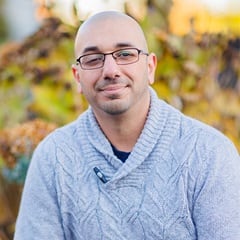How to Reinvent Yourself

There might come a time in your life when you feel drawn toward something greater — when you sense that you have more to offer the world or new responsibilities to take on. You might be intrigued by something out of the ordinary, or have a feeling of eagerness or impatience to further explore your passion.
Listen to those emotions. They might be telling you it's the perfect time to embrace change and reinvent yourself.
What Does it Mean to Reinvent Yourself?

Reinventing yourself is the process of growing into the person you want to be while staying true to what really matters to you, according to Kibar Moussoba '06 '08G, a senior program manager on the People Experience and Inclusion team at Southern New Hampshire University (SNHU). You might choose to change your career, your personal life or your mindset, for example.
“Reinvention is about evolving, expanding your skills and stepping into new opportunities that align with your passions and goals,” Moussoba said. “It’s about recognizing the potential for growth and taking deliberate steps to move forward.”
Moussoba, who recently shared insights on resilience and personal growth as a TEDx speaker, is familiar with the reinvention process himself. In fact, he sees it as an ongoing process that allows him to continuously expand on who he is and what he does.
“For me, reinvention has come when I’ve recognized that my impact could grow in new ways — whether that was expanding my career into employee experience or refining my skills as a DJ,” he said.
How Do You Reinvent Yourself?
![]() Reinvention doesn’t involve a single, big change. Instead, it’s all about continuous adaptation and growth to actively shape your future rather than staying stuck in old patterns. According to Moussoba, you can start the process by asking yourself these three questions:
Reinvention doesn’t involve a single, big change. Instead, it’s all about continuous adaptation and growth to actively shape your future rather than staying stuck in old patterns. According to Moussoba, you can start the process by asking yourself these three questions:
- Where do I feel the most energy and fulfillment?
- What challenges or limitations do I want to overcome?
- What kind of impact do I want to have?
"By reflecting on these, I can see where I need to grow or shift my approach. It all starts with awareness, and then understanding where you are and where you want to go," said Moussoba, who also serves on the Board of Directors for the Mental Health Center of Greater Manchester in New Hampshire. "Reinvention happens through action, and it’s never too late. The key is to start where you are, with what you have."
He also suggested these 5 steps for those ready to reinvent themselves:
- Recognize the opportunity by identifying what’s calling you to grow.
- Clarify your vision by defining what success looks like.
- Expand your skills by learning, practicing and refining.
- Build the right connections by engaging with people who reflect where you want to go.
- Take small, intentional steps toward your goal.
As you work through the process, Moussoba recommends setting clear, measurable and adaptable goals that align with your bigger vision.
"Instead of saying, 'I want to grow professionally,' I set goals like completing a certification, launching a new initiative or refining a skill within a set time frame," he said. "Creating structure, while leaving room for flexibility, allows for momentum and progress."
![]() He said that a structure like the SMART goal format can be helpful. SMART stands for:
He said that a structure like the SMART goal format can be helpful. SMART stands for:
- Specific
- Measurable
- Achievable
- Relevant
- Time-bound
If you're ready to reinvent yourself but feel stuck on where to start, you might think about furthering your education. That can be an easy way for you to set a clear, measurable goal within a defined timeline.
Moussoba said that a degree, certification or professional development course can create new possibilities by giving you the tools to step into a different job role or face challenges, like starting a new career — and there's no timeline on when to do it.
For instance, a recent AARP survey found a sharp increase in the number of older Americans seeking a career change who cited “to make a difference or do something meaningful” or “to follow my passion” as their primary reason for considering the change (AARP PDF Source).
Additionally, a study by the American Institute for Economic Research (AIER) found that 1-2 million workers aged 45-65 change careers each year, and 82% of workers over the age of 47 who pursued a new career successfully transitioned into their new role (AIER PDF Source).
These trends suggest that a significant number of people actively seek reinvention in their career and that it’s a common and rewarding endeavor among older workers.
Moussaba, for instance, pursued a Diversity, Equity and Inclusion (DEI) for HR certificate to support the work he does at SNHU, where he helps employee voices be heard, valued and acted upon to create a more inclusive and engaging work environment. "It wasn’t just about the knowledge," he said. "I saw (the certificate) as a way to enhance my impact and open new doors."
Can You Really Recreate Your Life?
![]() In short: You can. But it's important to note that recreating your life does not change your past. According to Moussoba, the reinvention process expands on who you are as a person rather than leaving everything behind.
In short: You can. But it's important to note that recreating your life does not change your past. According to Moussoba, the reinvention process expands on who you are as a person rather than leaving everything behind.
“Every experience you've had brings value to what comes next,” he said. “Changing direction is about leveraging your past experiences in a way that serves your future goals... Growth is always possible, and the skills, perspectives and connections you've built over time can be your greatest assets."
As someone who has overcome challenges, Moussoba said it's important to him to build meaningful connections in his professional life and beyond.
“Over time, I recognized opportunities to apply my skills in new ways — bringing people together, fostering engagement and driving meaningful change,” he said. “Keep learning, keep evolving and trust that every experience contributes to your journey.”
A degree can change your life. Choose your program from 200+ SNHU degrees that can take you where you want to go.
Amanda Hernandez is a copywriter at SNHU. She earned a bachelor’s degree in advertising from the University of Florida College of Journalism and Communications and has worked in higher ed marketing since 2011 as a copywriter, editor and content manager.
Explore more content like this article

Why is Balancing Work and Life Important?

Best Careers for Creative People

Students, Alums Strengthen Skills Through Black History Month Projects
About Southern New Hampshire University

SNHU is a nonprofit, accredited university with a mission to make high-quality education more accessible and affordable for everyone.
Founded in 1932, and online since 1995, we’ve helped countless students reach their goals with flexible, career-focused programs. Our 300-acre campus in Manchester, NH is home to over 3,000 students, and we serve over 135,000 students online. Visit our about SNHU page to learn more about our mission, accreditations, leadership team, national recognitions and awards.


